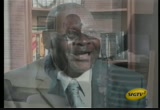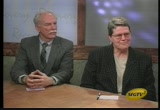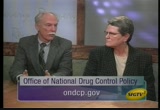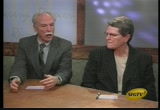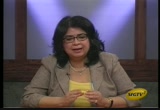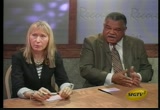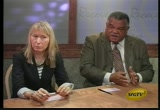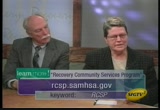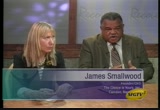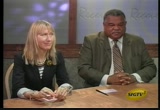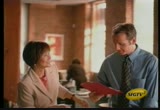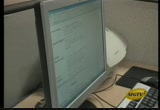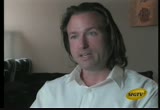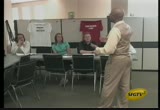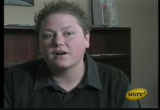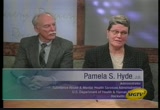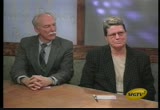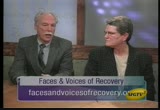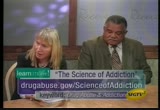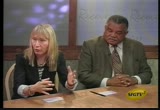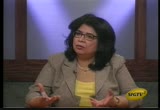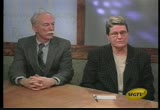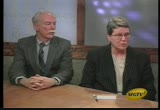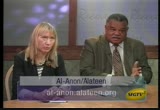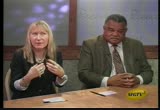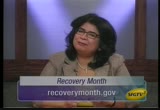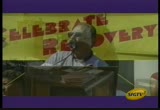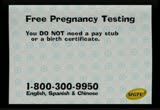tv [untitled] September 24, 2010 10:30pm-11:00pm PST
11:30 pm
i'm sober today. i'm happy today. i love people now. we all have different, as we say, doors that can be opened by different people, and hopefully somewhere along the line somebody will open one of those doors or crack one of those doors just enough for that person to have them see that "maybe i can try something different, maybe, just maybe if this person do it, just maybe i can." and if they'll just start that one step, we can work from there. pam, let's talk a little bit. we've talked about the need for continuing support for individuals after treatment. does a recovery-oriented system of care present opportunities for states to adopt measures that provide those supports? absolutely. literally looking at the things we've been talking about, about how people, where they live, whether or not they are able to work, whether or not
11:31 pm
they're able to retain or maintain or get back their family and friend relationships. those are all things we can in fact measure if you're looking at it from a systems point of view. and we at samhsa actually are starting to really think about how would we measure these things in ways that we can make it scientific and how can people like alexandre put that together. and how difficult is it to measure, alexandre? i'm not sure it's as difficult as people may fear, once we have some form of an agreement, which i think as a profession we're getting to have an agreement of what recovery is, which is what you asked me earlier and what tom spoke about as well. i think that it's a question of recognizing that recovery is more than abstinence and then essentially identifying the areas which are critical, not only to society and to treatment providers, but to people in recovery. tom, i-i want to go back, in order to do all of that,
11:32 pm
the policies have to be there. how does ondcp then assess the need to focus on the aspects of recovery that are going to sustain people in their sobriety or through medication-assisted therapy? well, first of all, i think it's been a shame that ondcp and the federal government generally hasn't recognized recovery more broadly and fully. and we want to change that. we're opening an office of recovery to-to do a lot of the things that were talked about. but government generally, from the ondcp perspective i think the first thing starts with saying what you want. what government wants is people to get into recovery. we don't just want people to be abstinent, we want them to have a full, rich life in recovery. so that's a good start. that's not enough. government needs to do more as the major
11:33 pm
purchaser of addiction services to start purchasing systems of care, not pieces. many states, many cities will tell you, yeah, we have a recovery- oriented system of care. this group over here does detox, that group over there does, you know, rehab, this group over here does long-term out-patient. but they haven't purchased a system. it's like saying i have a car-the wheels are down in the basement, the transmission's up there in the attic-i got a car. well, the car doesn't run. and we need to start purchasing what we really see is valuable, and that's the recovery system, not just the pieces. is that like the connecticut model, for example? connecticut's doing a very nice job. and there are places around the country. and other states. i think some of the best where you used to be in new mexico. they're doing a lot of that. that's correct. and these-these models really recognize the science, that the components of a person's life don't exist in-in a vacuum, nor do the components of a system exist in a vacuum.
11:34 pm
and recovery really, and frankly prevention as well, really has to do with multiple dimensions at the same time, sustained over time. and so that's the kind of system of care approach. very good. james, i want to go back to, for you to be able to tell us, you have done such a great job of getting individuals, of providing for individuals that second chance. can you tell us about the business that you started and how it's helping individuals that are in recovery? well, the business i started is a company i started, it's called the choice is yours, inc. and that was developed from a conversation with my sponsor on the phone trying to find a name for a company, and he, his frustration with me grew, so he said, "i'm going to bed, james. the choice is yours." and so it came about because of his frustration with me. now coming out of that is that the first class i ever did was for 25 single mothers with children who had addiction problem, who had gotten mortgages
11:35 pm
on homes and went into the homes for the first time, and one mother fell through the basement-there was no first floor in the home. so they'd been taken advantage of from the door, from that door on. so now in-in the 18th year of doing this, here i'm looking at people in recovery every day, and i might screen 75 people to get a good 20 to 30 to come into my program, because you have to meet certain criteria. i have an idea when you're ready to be trained, when you're ready to take on another aspect of your life. so in my program, we bring you in, and we tape test you and get you ready for, if we believe that you're educable right now to go to another level, in the construction fields, carpentry, plumbing, electrical, those kind of things; and also we added a therapeutic process to what we're doing now. so we can recognize that there's a problem in the classroom. from my being experienced in this, i can recognize people right way if they're having a problem dealing, if they're already on drugs in my classroom. if they have a problem concentrating or they're nodding out of my classroom. these things i can recognize, and i can help them,
11:36 pm
not putting them out of my classroom, but recommending them to a rehab facility, recommending them to another therapeutic approach, so they can continue getting treatment. my whole idea is-is to make these people whole, to empower them to be better than what they were before. and from there we are seeing an 82 percent retention rate in my program as far as job placement and retention of jobs... that's excellent. ...because of my case management. we have a 2-year case management. when you leave my company, we follow you for 2 years after that. so if you fall down, you go back on drugs, go back on your child support, back in prison, we have enough people around us to pull you back out and get you ready to go back to work again. and, pam, it seems like that that is an-an excellent example of what perhaps you may have experienced in-in new mexico. how does samhsa now take those experiences, and-and how do we provide the guidance for the states in order to continue to evolve in the field of-of addiction treatment? well, there are technical ways that we do that in
11:37 pm
terms of the kind of materials we produce and the information we produce and frankly the data that require-we require from the programs that we fund to make sure they're focusing on the right things. but i think the other thing is the type of things that we are trying to fund, and it's like the recovery-oriented systems of care or the recovery communities, because we're trying to look at things like when people are first in recovery, trying to do things, to do what james talks about- something as simple as transportation may be one of the biggest issues or just how to fill out resumes or how to-you know, just some very basic stuff like that. so we're trying to put the right kinds of dollars out, we're trying to put the right kinds of materials out, we're trying to make all of that available and then-and then get the concept of recovery in part through the way that we collect data and say this is what we're trying to get to. we frankly also try to support people in recovery. i think you're heard, and maybe we haven't said it
11:38 pm
explicitly, but people, the mutual support approach is as much as anything, is most important. when people have other people around them who are going through this, who have experienced it, who've gotten through it, and who can say hey, james, hey, pam, hey, tom, you know, you're screwing up, you need to shift. if i may add to this, i think that the support is extremely important. you know we-we have a lot of peer pressure when we start using drugs, because you don't use drugs alone, you use it around a group of people who we admire, who we want to be like. and that process also becomes very, very important once we reach recovery. can we still have the same peer pressure from those people who are in recovery, for those who have the 25, 20 years of recovery who know how to recover from drugs and know how to deal with the other aspects, not the drug now, the person himself right now. i think we talked about earlier about the celebration is that we-we lose a lot of people back to the streets because of a celebrating 1 year or 2 years or 3 years of recovery, of celebrating
11:39 pm
that with a party or something like that, and somebody brings in the-the nonalcoholic beer maybe and think they're doing the right thing. now they're back to where they were before. so there's an entire process here. and what we do in my program, we-we-we have mock interviews. we have mock-we talk about reading, writing, and arithmetic. we talk about how do you fill out that resume. and we do it over and over again. how do you fill a job application out? how do you sit at the table at the interview, and how do you poise yourself to look at an interviewer and be confident about this? so we bring all these things to the table before we release you from my program. as you say before, you know, our biggest problem has always been funding. how do you get-how do you get the funds to keep people doing what they want to do in my program, because we get many calls per day saying when is your next, when is your next program? but the people that i train, i can't charge them tuition, so i'm constantly looking for funding all the time to try to train these people to help them, to empower them to-to be better people. and when we come back, we're going to be talking about the resources that we need in order to have individuals sustain their recovery.
11:40 pm
we'll be right back. for more information on national alcohol and drug addiction recovery month events in your town and how you can get involved, visit the recovery month web site at recoverymonth.gov. nice job. (music) hey, man. how's it goin'? to a person recovering from substance use, what you say comes through loud and clear. daddy, daddy! i'm so glad you're home! if you know someone in recovery, give them support, and if you know someone who needs help, give them this number, 1-800-662-help. (music)
11:41 pm
pro act is a grassroots initiative that was founded about 12 years ago. and it was founded really to put a face on recovery to reduce stigma, to also help individuals and families access and sustain long-term recovery. we can start with food, beverage, hospitality. i've done that in my past, sure. okay. the services and supports that are available through pro act are really quite varied. and they go from one-on-one kinds of services: recovery coaching; helping someone develop a recovery plan, which is very different than a treatment plan; to providing really the kind of support that is nonblaming, nonstigmatizing to help people really feel comfortable accessing services. i believe the most important support services that we have here is peer to peer, where the new individuals that come into the center feel more
11:42 pm
comfortable when they know that they're talking to someone who's been through the same things that they've been through. it's nice to know that somebody else has been through what you went through. there's a little bit of comfort knowing that somebody can understand exactly the way i felt. the benefit of helping someone else cannot be overstated to the person giving the help and the person receiving the help. you get a feeling as if you'u're in a partnership and the two of you are doing something together. you both grow from it, and you both become better for it, and that feeling of hope continues to-to grow. i couldn't keep my mind straight. i'm thinking, you know, i need a doctor, i don't know what i'm doing. but it was the whole coming off of substances and then learning how... we also have many facilitated programs, which are life skills and helping people really skill-build kinds of
11:43 pm
services, not only gather information but also to really try out some of the skills in a safe way to be able to help them really fill in some of the gaps that they may have either lost or never had as a result of their addiction. they have computer classes, they have meetings, stress meetings, self-esteem meetings. they also have resources where you can find some place to stay if you don't have any place to stay. they have financial marketing skills where you can learn how to get your finances in order. they have a lot, just getting around in group discussions where you can meet new people and just gather information onto different places that you can go to help you stay clean another day. by putting a face on recovery, i love that saying, putting a face on recovery, and just by putting a face on recovery, you never know who's in recovery; you know, your doctor could be in recovery, your pastor could be in recovery, you know.
11:44 pm
i tell people you know when you were a little girl, a little boy, you grew up next door to mr. johnson-now you call him pop pop for the last 20, 30 years-he's in recovery, and you never knew it. i often share that, for me, i've had many people, even while working here say, "i can't believe you ever used drugs or alcohol." and i laugh because you know i say i can provide you with a list of people who 5 years ago would say they couldn't believe that i'd ever be in recovery. so pro act does a lot of work in breaking down a stigma to show that recovery is possible, that recovery happens; even having a place like this in the community shows that there is a place where recovery happens, rather than just a place where people can go buy drugs or alcohol. not saying that therapy is not important, i'm not saying that recovery through an outside entity is not important, because truly they are a basis. but when we come out of those places, when we try to establish our lives, there are barriers there, there are boundaries there, and sometimes we need the help to get past those boundaries.
11:45 pm
and pro act is definitely been the help for me to get past some of those boundaries, yes. pam, recovery month is sponsored by samhsa. it is. do you feel that recovery month has been a component within the addiction treatment field that has contributed to the rallying of individuals in recovery? absolutely, and in-for many reasons. one is it's run, it may be sponsored by samhsa, but it's really run, administered, the ideas, the plans are a lot of volunteers. so a lot of people who are advocates, who are family members, who are people in recovery, who are parents, who are providers really get together and work on this. this is september every year, and this year it's going to be "join the voices of recovery: now more than ever." i think we have an opportunity frankly, because at the federal level we have people like tom and myself and others in clear places in the federal government that believe in recovery and want to support it and an opportunity to meet with
11:46 pm
those advocates and volunteers lately, and they're-they're jazzed and ready to go. the point of it is to try and help america understand recovery, try to help people who are in recovery feel proud of that, try to help people who know somebody in recovery know how to be supportive, and, frankly, try to get people to understand how they can advocate for the services and programs that recovery needs. why is that important, tom? oh, i'll tell you one of the major reasons it's important is that people don't know what recovery is. in polls you ask normal people what is-what's recovery-they think it's somebody trying to become sober. and so it's terribly wrong. tragically, there's a lot of people even in the field who don't think people get into recovery because as they-if they're in substance abuse treatment, all they see are people returning. so they don't see people living rich, full lives.
11:47 pm
and, as pam said beautifully, this is for america. america needs to see success. and these people are successes by anybody's estimates. so gil kerlikowske, the director of ondcp and i and lots of people at ondc are very, very proud to be working with the faces and voices of recovery, which is one of the organizations, and with samhsa on-on doing everything we possibly can to support this. alexandre, how important is that to have support for recovery as you're looking to conduct further studies in that field? well, it's critical because so far there's been an enormous amount of federal investment which has contributed landmark findings and really lifesaving findings in many ways, scientifically speaking, in terms of the ideology of addiction, what is the cause, as tom said, it's a brain disease, it's a biological condition, and it's really
11:48 pm
started to contribute significantly to moving away from the stigma where people looked at addiction, alcoholism, drug dependence as a moral failing or the person was just bad and weak to something where the person has a condition, which is perhaps chronic, but it is a condition that can be managed. so we have a science of addiction which has saved many lives. what we don't have is the science of recovery right now. there's much we don't know, as tom and pam said; society doesn't really know that recovery is even a reality, because not only for people in our field, as tom said, some people in our field don't really know recovery is an option; but when you look at how addiction and recovery are portrayed, say, in the media, in the general media, you see celebrities, and, i'm sorry to say that, but most of the time you only hear of them when they relapse because it's a lot more sexy and dramatic than if they're just putting their lives back together. i mean, who wants to hear somebody's doing well?
11:49 pm
it's boring, unfortunately. it's boring for the public. but for the person like james and the other 20 million and probably more than that whose lives have been touched and improved and then their families, their community, their children, their loved ones, their employers, it's critical. therefore, it's critical, i think, to the health of the nation and to this goal that pam mentioned of really helping the nation understand and achieve recovery, that there'd be support at the federal level for supporting that science, because it has to be, and i think one of the beauty of having tom in the current position is you believe in science, you believe that things should be empirically based. and we currently lack that empirical basis. so that support is critical. getting back to the families. you know, i think that it's-it's so telling that you mentioned the families because you know my brother is bipolar with alcoholism, diabetes,
11:50 pm
high blood pressure. and you know, really, i think the nation needs to better understand recovery, and they also need to understand that addictions probably touch every single family in this nation. and that in essence they need to be ready to be there to support. right, pam? i mean, i think it's-it's not only to get them to understand recovery and addiction, etc., and the whole continuum, but really to get them to be supportive and not to give up. that's right. so many times families, by the time they're interested in learning about this, are already dealing with a family member who has disrupted the family, who they've had to separate from, who has turned up homeless, and they're very worried about them or any other way in which the family feels assaulted by that process. so it's really important for them to get hope, it's really important for them to understand that things can be better, it's important to understand that they can get some support as family members.
11:51 pm
so all of these things are critical, and frankly there is no better advocate than a convinced family member for treatment programs, for science, for all of the things, for people than family members. and what type of resources are out there, tom and pam and alexandre and james, for individuals who really do need to look for support for-for their loved one who has just left treatment? i can answer that with two words: not enough. it's a terrible area of shortage; partly because of the concept of this illness. it was weakness, it was-or just a lot of drug use, what do you need family support for? just get dried out. well, it's not. as james poignantly said, this recovery is a process, it takes a long time. and, as pam was-was suggesting, families can help. there are things they can do right, and there are things they can do wrong. we need to develop many more supports for them,
11:52 pm
ways to bring them into the game of-of supporting recovery. and one of the things we haven't talked about, and i think we need to now, is-is really not to give up on an individual when they relapse. sure, yea. we don't give up on a diabetic when they have another episode or another issue they need to deal with. and that's true of any chronic disease, relapse is sort of normal. so i think the issue is how to use those relapses to help the individual understand what happened, what were the triggers, what are the things they can do to develop coping mechanisms to not have that happen again. there's lots of ways that are very positive about relapse in-in many ways. talk to us a little bit about the recovery community support programs, because in some states we do have a cadre of individuals who are in recovery who basically provide each other with the support networks, and-which are very effective. you know, i think this is-this came in some ways
11:53 pm
out of an aa model years ago where the assumption was that it was up to the individuals themselves and government really couldn't help this or paid programming really couldn't help this. and i think what we understand is that, while that is absolutely critical, that sometimes the people who are trying to help each other need a little support themselves. so things i talked about earlier, some transportation assistance, just supporting each other and families, and just having opportunities to socialize in ways that are positive, so there's a whole lot about this program that allows a little more flexibility than we normally would put into a program, which tends to like to fund counseling and detox and things of that nature. so this is more the life issues and supporting people who are in recovery who are trying to support each other. let me add to that a little bit. you talked about the family aspect as far as helping the individual. that works in two different segments there. i think that one of the problems we have with the recovery is a lot of times the family becomes the
11:54 pm
enabler of the person who's trying to recover, which makes the recovery process a lot longer. and by the time he recovers, he is so severely damaged because a lot of times family thinks they can be the rehab, they can be the detox. and once-and then the family gets let down if the person relapses, and now they want nothing else to do with you again. so now- we have to find a way because there's al-anon, which is part of alcoholics anonymous. there's nar-anon, which is part of narcotics anonymous. if the family could possibly position themselves to attend those meetings, they may become a much clearer person on the aspects of recovery. and that's why the family really has to learn how to best support and how to best help the individual who-who is in recovery. there are so many families who think they're being helpful by allowing their son to drink in the basement. but they don't want to put him out on the street, because they don't want to put him out on the street. and so having-helping a family understand how to deal with that situation and not feel like it's rejecting their family member is really critical.
11:55 pm
alexandre? one of the things that several of the points that were just made touched on indirectly is also that the stigma of addiction is not only directed to the individual that's affected by the drug and addiction, but it's directed to the family as well. so james said people think they can help by themselves, so the people don't go to treatment because it's like "we must have done something wrong as a family; our son or our daughter or my husband or somebody in my family has a drug problem. i failed. so i'm going to try to fix it now." and the reality of it is, unfortunately because, and i really believe that if the message of recovery, which is really disseminated by programs like this in recovery month and samhsa and ondcp, if the reality of recovery in all of its glory and joy really is [french word], in french, was as known by the american public as are
11:56 pm
the ills of addiction, families who are affected by this problem would be more likely, i think, to realize "my son or daughter has a problem." if it was diabetes or hypertension, they wouldn't be ashamed. and we have to make it such that we can get to that level, which will take some time, i think. and, indeed, thank you for mentioning recovery month once again, because recovery month is celebrated every september, and we hope that all of our audience really gets engaged and really gets involved. it is a very worthwhile endeavor, and we want you to be part of it. thank you for being with us. great program. for a copy of this program or other programs in the road to recovery series, call samhsa at 1-800-662-help or order online at recoverymonth.gov and click multimedia.
11:57 pm
every september, national alcohol and drug addiction recovery month provides an opportunity for communities like yours to raise awareness of alcohol and drug use disorders and highlight the effectiveness of treatment. in order to help you plan events and activities in commemoration of this year's recovery month observance, the free recovery month kit offers ideas, materials, and tools for planning, organizing, and realizing an event or outreach campaign that matches your goals and resources. to obtain your copy of this year's recovery month kit and gain access to other free publications and materials related to addiction treatment and recovery issues, visit the recovery month web site at www.recoverymonth.gov or call 1-800-662-help. it's important that everyone become involved,
11:58 pm
39 Views
IN COLLECTIONS
SFGTV2: San Francisco Government Television Television Archive
Television Archive  Television Archive News Search Service
Television Archive News Search Service 
Uploaded by TV Archive on

 Live Music Archive
Live Music Archive Librivox Free Audio
Librivox Free Audio Metropolitan Museum
Metropolitan Museum Cleveland Museum of Art
Cleveland Museum of Art Internet Arcade
Internet Arcade Console Living Room
Console Living Room Open Library
Open Library American Libraries
American Libraries TV News
TV News Understanding 9/11
Understanding 9/11